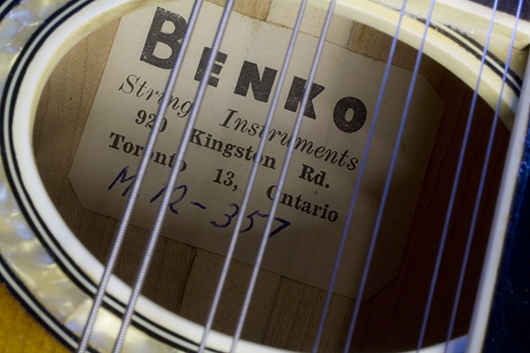920 Kingston Road was the first address of The Twelfth Fret in 1977. It had been empty for some time when we moved in, but later I realized that it had been a Luthier’s Mecca since 1954.
I was aware that Joe Kovacic of Lado Guitars had his workshop there for several years but as I picked through the rubble in the basement, I found jigs and tools that were clearly much older than Joe’s Shop. We also had customers tell us that their instruments were built in the 920 Kingston Road workshop by Mr Benko of Benko Musical.
Then in 1978 I was visited by Frank Benko himself. He had retired from instrument building in 1974 but still built mandolins as a hobby. I helped him out with supplies of fretwire, bone and tuners.
Years later, long after he had passed away, I realized I had foolishly neglected to ask him about his background and building history.
Recently I got a visit from Frank’s son, John Benko. John has been a tool-and-die machinist all of his life. He helped his father in his workshop in early days and built guitars himself as well. John brought us a lovely mandolin plus the last guitar he built back in 1999. He also offered us Frank Benko’s lifetime collection of tone woods which we immediately snapped up. But most important of all, I finally had an opportunity to ask him about his father’s life.
Frank Benko was born in Croatia in 1925 and immigrated to Montreal in the late 1930s where he started up his workshop. He built mainly mandolins and his popular Croatian Brac. The Brac, pronounced “Brach” is a small body, 4 string, double-course, fretted instrument roughly the shape and size of tenor guitar. It is very popular as a melody instrument throughout the Balkan states. He also built acoustic guitars and stand up string basses.
In 1952 he moved the family to Toronto and setup shop on Berkley Street.
Then in 1954 he moved the shop to the 920 Kingston road address. The storefront where I had The Twelfth Fret was a tailor’s shop and the Benko workshop was only accessible from the back alleyway. Much of the workshop was a converted car garage. When I setup shop I found everything was nicely wired for 220 volts but it was very cold in winter. I later realized that the plywood floor was placed directly on the soil !
During the folk era of the 1960s his business flourished and he routinely built and restored guitars for the local Toronto session players and even built two guitars for Gordon Lightfoot. Frank Benko retired in 1974 and passed away in 1980.
I asked John Benko about several large instrument molds that I found in the basement of 920 Kingston. He told me that they were actually molds for cases. Frank and John actually build their own cases ! I had often wondered where these lovely arched Benko cases were made as they were similar to other vintage cases but not exactly the same…now the mystery is solved! John built most of the cases during the 60s and 70s for his father.
The Benko mandolins have a lovely tailpiece with the 1967 Canadian Centennial maple leaf logo in the corner; truly something of special significance to a new Canadian who had escaped the chaos of post-war eastern Europe. John made these elegant tailpieces for his father in his tool-and-die shop.
I am constantly on the prowl for these instruments as fine examples of musical Canadiana.
To date I have seen roughly 30 or 40 Benko instruments come through our shop. All have been beautifully finished in nitrocellulose lacquer. Clearly his attention to detail, and his use of well aged woods contributed to the longevity of his instruments. Most still look brand new even after 40 or 50 years of life. His building techniques were superb as each and every Benko I have seen has no sign of the structural issues commonly seen in instruments from that era. Most of the guitars and mandolins have slightly deeper body construction which enhances bass response. By and large, Frank and John Benko were breaking new ground in the 50s and 60s and Benko Musical occupies a unique niche in the history of stringed instrument building in Canada.




















